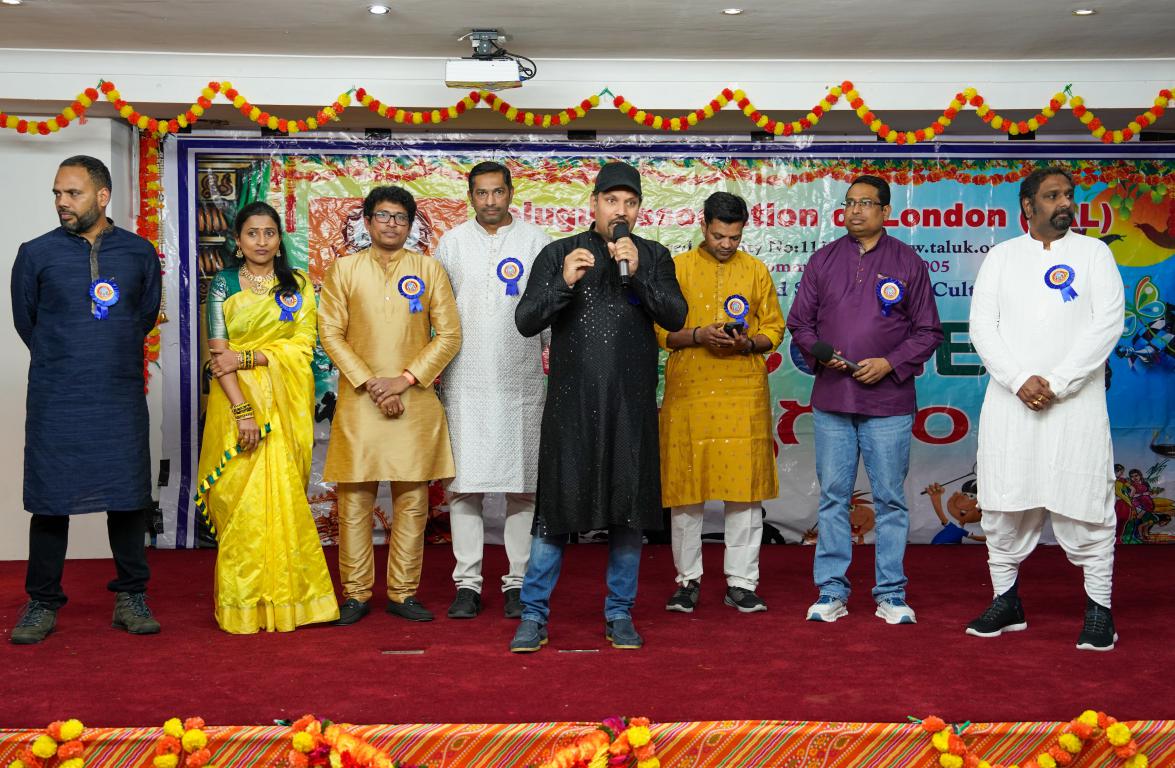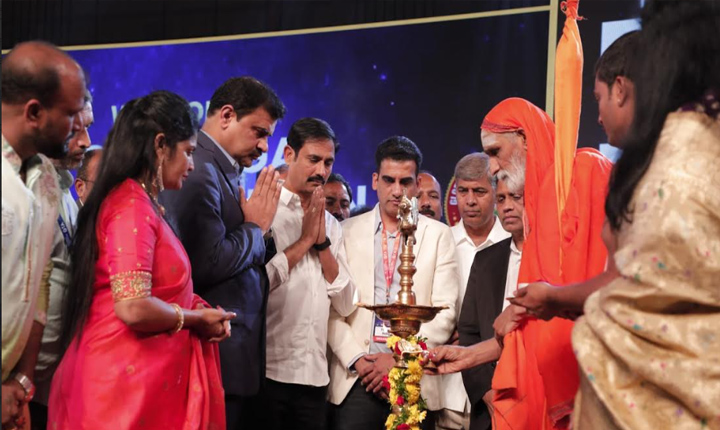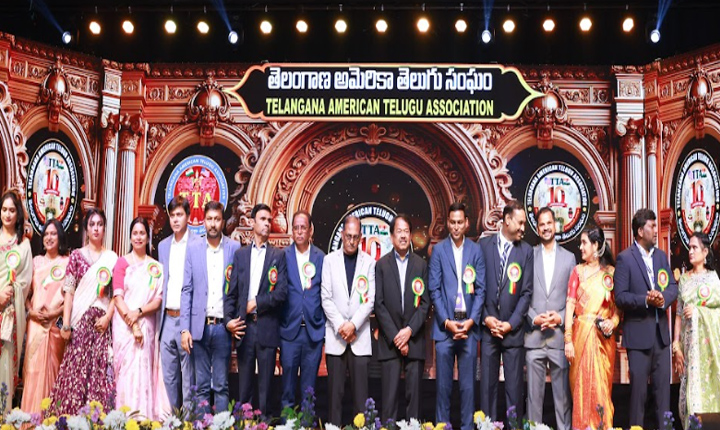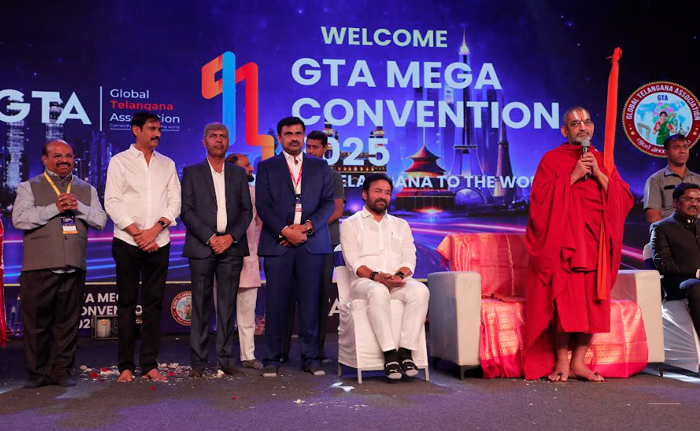Bathukamma Blossoms Across America: Telangana’s Floral Festival Finds Its Rhythm Abroad
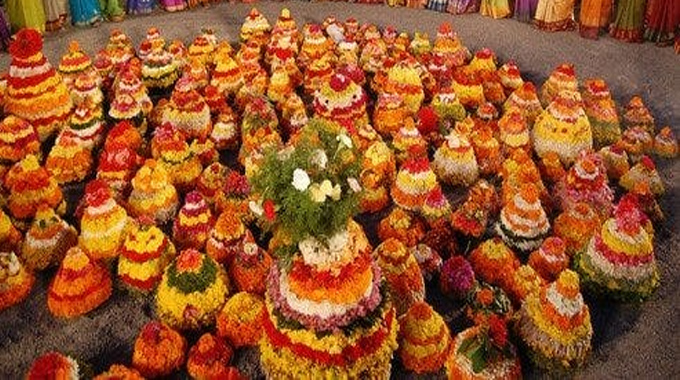
Every autumn, as the leaves in America turn golden and pumpkin patches appear across suburban towns, another kind of color quietly fills the parks, temples, and community centers of the United States. Circles of women dressed in bright saris sing folk songs in Telugu, children run around balancing flower baskets, and at the center of it all stand stunning stacks of blossoms — Bathukamma.
For Telugus in America, especially those from Telangana, Bathukamma is more than a festival. It is memory, heritage, and identity woven together with flowers. And in recent decades, it has blossomed into one of the diaspora’s most cherished cultural celebrations, echoing far from its native land.
From Villages to Apartments
In Telangana, Bathukamma has always been a festival of the people — women gathering with seasonal flowers like gunuka and tangedu, arranging them into conical stacks, and singing as they dance in circles. When the first wave of students and IT professionals from Telangana arrived in the U.S. in the 1980s and 1990s, the festival came with them.
“I still remember our first Bathukamma in Dallas in 1994,” recalls Lakshmi Reddy, who moved to Texas as a young bride. “We had no tangedu flowers, so we used marigolds and roses from Walmart. There were only five families, but the joy was the same as back home.”
Back then, Bathukamma was celebrated quietly in apartments and university dorms. Yet those small circles of women singing Bathukamma songs in faraway lands kept the tradition alive.
The Rise of Community Celebrations
As the Telangana diaspora grew, the celebrations spilled out of living rooms and into public spaces. Organizations like the Telangana Cultural Association (TCA) in the Bay Area, the Telangana Development Forum (TDF), and regional groups in Dallas, New Jersey, Chicago, Seattle, and Atlanta began hosting large Bathukamma events.
Today, Bathukamma in America is a grand spectacle. Parks echo with folk songs, traditional dances are performed on stage, and authentic Telangana food is served in abundance. Entire families — grandparents to toddlers — take part, turning the festival into a unifying moment for the community.
“It’s no longer just women making Bathukammas,” says Rajesh Chava, a volunteer in California. “The whole community comes together — men help arrange flowers, kids perform dances, and everyone pitches in for food and logistics. It has become our identity marker here.”
Bathukamma Becomes the “Dandiya” of Telugus
For North Indians in the U.S., Dandiya and Garba nights became cultural anchors — community gatherings that drew thousands and cemented a sense of belonging. Bathukamma has followed a similar path for Telugus.
What was once a women-centric ritual in Telangana has transformed abroad into a festival of identity for the diaspora. Men, women, and children participate, not just in rituals but in cultural programs, competitions, and community feasts. Bathukamma has become a “must-attend” celebration every fall — the Dandiya of Telugus in America, a symbol of both tradition and togetherness.
“For Gujaratis, Navratri means Dandiya,” explains Swapna, a second-generation Telugu American. “For us, Bathukamma is that big cultural moment. My non-Telugu friends look forward to it every year now — they call it ‘the flower Dandiya’!”
Recognition and Cultural Exchange
The festival’s growing popularity has not gone unnoticed. City councils in California and New Jersey have issued proclamations honoring Bathukamma, recognizing it as part of the rich cultural mosaic of America. Curious neighbors and colleagues often join, learning about the floral traditions of Telangana just as others experience Diwali or Holi.
“When the Mayor of Sunnyvale joined us and spoke about Bathukamma, I felt tears in my eyes,” recalls community elder Saroja Akula. “To see our village tradition respected on American soil — it was a proud moment.”
Passing the Torch to the Next Generation
For second-generation Telugu Americans, Bathukamma is often their first hands-on connection to Telangana’s heritage. Schools may not teach them Telugu songs, but at Bathukamma events they learn to sing, dance, and carry forward traditions their parents once knew by heart.
“I can’t speak Telugu fluently,” admits 12-year-old Meghana from Fremont, “but I know all the Bathukamma songs by heart. It makes me feel connected to my amma’s childhood.”
Mothers and grandmothers see the festival as a bridge between worlds — one that keeps children rooted while allowing them to grow in American soil. The flower stacks become symbols of continuity, ensuring that Telangana’s spirit thrives across oceans.
More Than a Festival
Bathukamma in America is no longer just a ritual or seasonal celebration. It has become a cultural movement, a testament to the resilience of tradition and the creativity of diaspora communities.
Every circle of women around Bathukamma, every proclamation from an American city, every child who learns a folk song ensures that Telangana’s floral festival continues to bloom — not just in its native soil but across continents.
In many ways, Bathukamma has come to stand for what diaspora festivals often do: a chance to remember home, to celebrate identity, and to share culture with the world. And like the flowers it is built upon, Bathukamma has rooted itself firmly in American soil, blossoming into something vibrant and enduring.
Quick Facts: Bathukamma at a Glance
Origin: Telangana, India
Meaning: “Mother Goddess, come alive”
When Celebrated: During the nine days of Navratri (September–October)
Tradition: Women arrange seasonal flowers into a stack, sing folk songs, and dance in circles before immersing Bathukamma in water.
Flowers Used in Telangana: Gunuka, Tangedu, Banthi (marigold), Chamanthi (chrysanthemum), Lotus, and others.
Flowers in the U.S.: Marigolds, roses, chrysanthemums, sunflowers, and even artificial blossoms.
U.S. Adaptation: Once private home gatherings, now large community events in cities like San Jose, Dallas, Seattle, Chicago, New Jersey, and Atlanta.
Cultural Parallel: Just as Dandiya/Garba symbolizes North Indian diaspora identity, Bathukamma has become the Telugu community’s cultural anchor in America.
This Year
This year, the Telangana Cultural Association (TCA) proudly marks its 21st Annual Bathukamma Festival in the Bay Area. The celebration will be held at Ortega (Bathukamma Park) Park in Sunnyvale on Sunday, September 28th, from 1:00 PM to 6:00 PM.
Vijay Chavva – Founder Telangana Cultural Association


